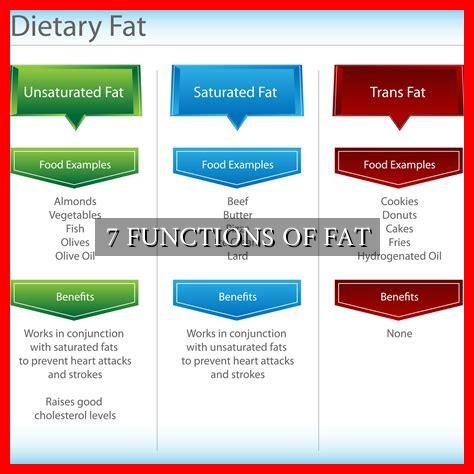-
Table of Contents
7 Functions of Fat
Fat often gets a bad rap in the health and wellness world, but the truth is that fat plays a crucial role in our bodies. From providing energy to supporting cell growth, fat is essential for overall health. In this article, we will explore the seven key functions of fat and why it is important to include healthy fats in our diet.
1. Energy Storage
One of the primary functions of fat is to store energy. Fat cells, also known as adipocytes, store excess energy in the form of triglycerides. When the body needs energy, it can break down these triglycerides to fuel various metabolic processes. This energy storage mechanism helps to maintain energy balance and support overall bodily functions.
2. Insulation
Fat also serves as an insulator, helping to regulate body temperature. Adipose tissue, which is composed of fat cells, acts as a thermal insulator, helping to keep the body warm in cold environments. Additionally, fat provides cushioning and protection for vital organs, helping to prevent injury.
3. Hormone Regulation
Fat plays a crucial role in hormone regulation. Adipose tissue produces hormones such as leptin and adiponectin, which help to regulate appetite, metabolism, and insulin sensitivity. These hormones play a key role in maintaining metabolic balance and overall health.
4. Cell Structure
Fat is an essential component of cell membranes. Phospholipids, which are a type of fat, help to maintain the structure and function of cell membranes. These fats are crucial for cell signaling, nutrient transport, and overall cellular function.
5. Brain Health
Fat is essential for brain health and function. The brain is composed of approximately 60% fat, and certain fats, such as omega-3 fatty acids, are crucial for cognitive function, memory, and mood regulation. Including healthy fats in the diet can support brain health and overall cognitive function.
6. Absorption of Fat-Soluble Vitamins
Fat plays a key role in the absorption of fat-soluble vitamins, including vitamins A, D, E, and K. These vitamins require fat for absorption and transport in the body. Including healthy fats in the diet can help to ensure adequate absorption of these essential vitamins.
7. Satiety and Taste
Fat plays a role in satiety, helping to signal to the brain that we are full and satisfied. Including healthy fats in meals can help to promote feelings of fullness and reduce the risk of overeating. Additionally, fat adds flavor and texture to foods, making meals more enjoyable and satisfying.
Conclusion
While fat has often been demonized in the past, it is clear that fat plays a crucial role in our bodies. From energy storage to hormone regulation, fat is essential for overall health and well-being. Including healthy fats, such as avocados, nuts, seeds, and fatty fish, in our diet can support these important functions and promote optimal health. By understanding the seven key functions of fat, we can make informed choices about our diet and lifestyle to support our overall health.





